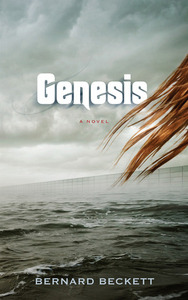Take a photo of a barcode or cover
dark
mysterious
reflective
medium-paced
Plot or Character Driven:
Character
Strong character development:
Yes
Loveable characters:
Complicated
Diverse cast of characters:
Complicated
Flaws of characters a main focus:
Yes
This is written in the vein of a philosophical dialogue between a teenager and an Examination board and an AI and a human, arguing the basic nature of what defines life and consciousness, evolution, and freedom. The conclusion is one I particularly disagree with. Ultimately, I find it fascinating I am just coming to find Becket as if there was science fiction author I could best compare him to it'd be Phillip K. Dick (I'd probably blame the publisher for pegging him as YA).
Genesis was most certainly an excellent read, and I'm inclined to think that it would have been even if science-fiction and dystopia weren't two of my favourite genres.
It doesn't start out excellent, at the very best at a level above mediocre, but as the story progresses, almost every sentence becomes quote- and thought-worthy. By the end there were several Ideas about sentience, thoughts, artificial intelligence and many other things and concepts swarming in my mind in a particularly pleasant way, a feat that books rarely accomplish.
I find it somewhat funny that Art reminded me extensively of Adam (from [b:The Moon is a Harsh Mistress|16690|The Moon Is a Harsh Mistress|Robert A. Heinlein|http://photo.goodreads.com/books/1166740333s/16690.jpg|1048525]), the way he came from a simplistic thinkum (though it wasn't described in Genesis) to a par-human child and a super-human adult AI. Art and Adam are probably the most remarkable characters in the story, which isn't surprising seeing as the former is an important part in the life and demise of the latter, who in turn is the focal point of the story.
The main plot twist was somehow looming around from the middle of the book, though it was almost impossible to define it precisely, I guess the Idea was flying through the pages, but my neuron connections failed to grasp its essence. And that is fine, because there was still some amount of pleasant surprise, which is what I expect from literature.
It doesn't start out excellent, at the very best at a level above mediocre, but as the story progresses, almost every sentence becomes quote- and thought-worthy. By the end there were several Ideas about sentience, thoughts, artificial intelligence and many other things and concepts swarming in my mind in a particularly pleasant way, a feat that books rarely accomplish.
I find it somewhat funny that Art reminded me extensively of Adam (from [b:The Moon is a Harsh Mistress|16690|The Moon Is a Harsh Mistress|Robert A. Heinlein|http://photo.goodreads.com/books/1166740333s/16690.jpg|1048525]), the way he came from a simplistic thinkum (though it wasn't described in Genesis) to a par-human child and a super-human adult AI. Art and Adam are probably the most remarkable characters in the story, which isn't surprising seeing as the former is an important part in the life and demise of the latter, who in turn is the focal point of the story.
The main plot twist was somehow looming around from the middle of the book, though it was almost impossible to define it precisely, I guess the Idea was flying through the pages, but my neuron connections failed to grasp its essence. And that is fine, because there was still some amount of pleasant surprise, which is what I expect from literature.
This book was pretty amazing. At first, I didn’t like the format, but with the ending, I realized why it had been necessary. I also at first thought the story should have been longer but changed my mind by the end - this story was the perfect length for the message it’s trying to get across.
The twist ending was AMAZING. I always love books that take the reader’s inability to actually see what’s going on and use it against them, in a way - I think it’s ingenious!
A very good and easy read.
The twist ending was AMAZING. I always love books that take the reader’s inability to actually see what’s going on and use it against them, in a way - I think it’s ingenious!
A very good and easy read.
Wow, the ending of this book completely shocked me.
I can't say much about this book without spoilers. It was an amazing read, so gripping and thought provoking. The ending completely blew me away. This one will stay with me for a long time to come. I think I may just buy this one for my personal library, and I very rarely do that.
Oh. My.
A librarian friend shoved this into my hands when I mention enjoying science fiction, and to be honest I was a bit dubious - I'd never heard of Beckett, for a start. Anyway, I started reading it last night and... I couldn't put it down. Quite seriously. I read it in one hit. Now, it's YA, and it's only 145 pages, but still - I considered going to sleep at one point, but I picked it right back up again and kept on reading. Totally addictive.
This review has some spoilers
In one sense, the book's story happens over only five hours: the five hours of Anaximander's examination to try and get into The Academy. Her special topic is the life of Adam Forde, on which she expects to get grilled by the three Examiners for the whole time. Her first surprise comes when they ask her about the early years of The Republic, and she has to scrabble for her memory of history. Then they finally come to Adam, and the formative moments of his life, and she is comfortable in what she knows - although she also knows that some of her theories are controversial. Things do not, of course, proceed exactly as she had anticipated...
On another level, the examination is a clever way of recounting a fairly large whack of the book's immediate history, without it feeling overwhelmingly like an info-dump, and weaving a story through those events. Anax and her Examiners, it is revealed, live in almost a post-apocalyptic world. The setting, New Zealand, is apparently the only place to have survived a dreadful war and subsequent plagues, all thanks to a far-seeing and eventually quite ruthless business man, Plato. He insisted on NZ's quarantine, enforced by a great sea fence. The society which eventually developed - or was designed - centres on people's usefulness to society, and their talents as determined by genetic testing. Adam Forde had been tested as being a Philosopher - the highest grade possible. But when he acts against his training - allowing a refugee girl past the sea fence - things start to get out of control. And then he is asked to interact with an Artificial Intelligence, to help it learn.
On yet another level, of course, the book is a searching and illuminating examination of what it means to be human, what it means to construct a society and what things we are willing to give up to have a safe society, how important safety and comfort are and at what price they should be bought... you know, all the easy topics. It's not done cavalierly; I am staggered by how much depth Beckett managed to cram into this little book.
Perhaps the most clever aspect of the book is that you could simply read the story, and it's quite engaging. You could read it and understand some of what Beckett is discussing about society, and it's riveting. And then, when you start understanding the classical allusions, things get really interesting: Anaximander was one of the earliest Greek philosophers, apparently teaching Pythagoras and getting all into the scientific mode of thought. Her teacher in the book is Pericles - he who led Athens during part of her Golden Age, fostering democracy, beginning the Parthenon, and involved with the war on Sparta. The society of The Republic (set up by Plato? this is one of the more blatant references, and perhaps it was done deliberately to trigger the classical connections) is a lot like Sparta, and like what the original Plato suggested too. This is a very, very clever set up - but not so clever as to be overwhelmed by smugness.
The conclusion is... well, I am still thinking about it.
This is a magnificent book, and I can't believe I had never heard about it. I think I may have to try and buy it so I can shove it into other, unsuspecting hands.
A librarian friend shoved this into my hands when I mention enjoying science fiction, and to be honest I was a bit dubious - I'd never heard of Beckett, for a start. Anyway, I started reading it last night and... I couldn't put it down. Quite seriously. I read it in one hit. Now, it's YA, and it's only 145 pages, but still - I considered going to sleep at one point, but I picked it right back up again and kept on reading. Totally addictive.
This review has some spoilers
In one sense, the book's story happens over only five hours: the five hours of Anaximander's examination to try and get into The Academy. Her special topic is the life of Adam Forde, on which she expects to get grilled by the three Examiners for the whole time. Her first surprise comes when they ask her about the early years of The Republic, and she has to scrabble for her memory of history. Then they finally come to Adam, and the formative moments of his life, and she is comfortable in what she knows - although she also knows that some of her theories are controversial. Things do not, of course, proceed exactly as she had anticipated...
On another level, the examination is a clever way of recounting a fairly large whack of the book's immediate history, without it feeling overwhelmingly like an info-dump, and weaving a story through those events. Anax and her Examiners, it is revealed, live in almost a post-apocalyptic world. The setting, New Zealand, is apparently the only place to have survived a dreadful war and subsequent plagues, all thanks to a far-seeing and eventually quite ruthless business man, Plato. He insisted on NZ's quarantine, enforced by a great sea fence. The society which eventually developed - or was designed - centres on people's usefulness to society, and their talents as determined by genetic testing. Adam Forde had been tested as being a Philosopher - the highest grade possible. But when he acts against his training - allowing a refugee girl past the sea fence - things start to get out of control. And then he is asked to interact with an Artificial Intelligence, to help it learn.
On yet another level, of course, the book is a searching and illuminating examination of what it means to be human, what it means to construct a society and what things we are willing to give up to have a safe society, how important safety and comfort are and at what price they should be bought... you know, all the easy topics. It's not done cavalierly; I am staggered by how much depth Beckett managed to cram into this little book.
Perhaps the most clever aspect of the book is that you could simply read the story, and it's quite engaging. You could read it and understand some of what Beckett is discussing about society, and it's riveting. And then, when you start understanding the classical allusions, things get really interesting: Anaximander was one of the earliest Greek philosophers, apparently teaching Pythagoras and getting all into the scientific mode of thought. Her teacher in the book is Pericles - he who led Athens during part of her Golden Age, fostering democracy, beginning the Parthenon, and involved with the war on Sparta. The society of The Republic (set up by Plato? this is one of the more blatant references, and perhaps it was done deliberately to trigger the classical connections) is a lot like Sparta, and like what the original Plato suggested too. This is a very, very clever set up - but not so clever as to be overwhelmed by smugness.
The conclusion is... well, I am still thinking about it.
Spoiler
I began to guess at the twist when the Examiners were pushing Anax about the Final Dilemma, and the discussions between Art (the AI) and Adam. I realised there just had to be some great reveal coming up, and that Anax and the Examiners were actually descendants of Art simply made sense. It didn't lessen the tension, though - and it in no way prepared me for Pericles' actions in the very last paragraph. I can't believe I managed to sleep after that; it was, truly, gut-wrenching.This is a magnificent book, and I can't believe I had never heard about it. I think I may have to try and buy it so I can shove it into other, unsuspecting hands.
Increíble. Muy original. Buena narración con final sorprendente.
I have been going through my mountain of a TBR list and eliminating books that no longer interest me. This one should really not have survived the culling …..
The story is told in the form of an oral exam being conducted with a young woman named Anaximander which she needs to pass to gain entry in to the prestigious Academy. She has worked years with her tutor to get herself ready for the gruelling 4-hour exam and through her telling the reader learns about this dystopian world.
This is a world where one island is the last safe haven for human inhabitants. It is the only virus free place on earth and is kept a closely guarded secret. Until one day one of the sentry guards lets one shipwrecked girl in……
Sounds good doesn’t it? It’s not.
Wait let me rephrase, this is not a bad book if you know that it will be taking a (debatable) philosophical look at Artificial Intelligence and if you like books that do not allow you inside the head of the characters but rather lets you stand completely apart from them observing in a very noncommittal way.
The story is told in the form of an oral exam being conducted with a young woman named Anaximander which she needs to pass to gain entry in to the prestigious Academy. She has worked years with her tutor to get herself ready for the gruelling 4-hour exam and through her telling the reader learns about this dystopian world.
This is a world where one island is the last safe haven for human inhabitants. It is the only virus free place on earth and is kept a closely guarded secret. Until one day one of the sentry guards lets one shipwrecked girl in……
Sounds good doesn’t it? It’s not.
Wait let me rephrase, this is not a bad book if you know that it will be taking a (debatable) philosophical look at Artificial Intelligence and if you like books that do not allow you inside the head of the characters but rather lets you stand completely apart from them observing in a very noncommittal way.







